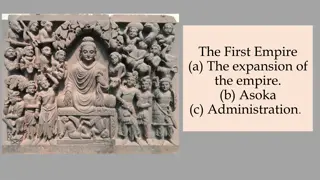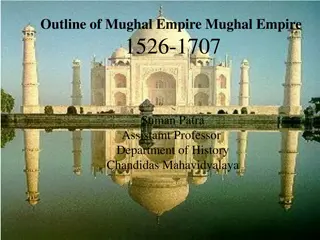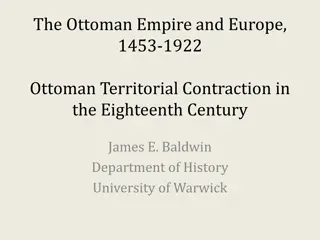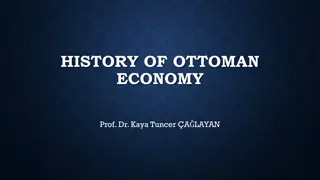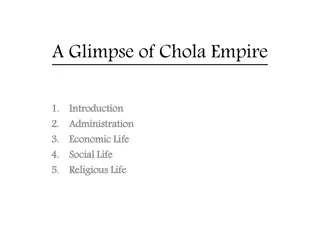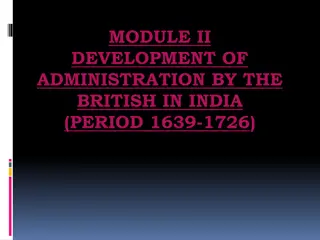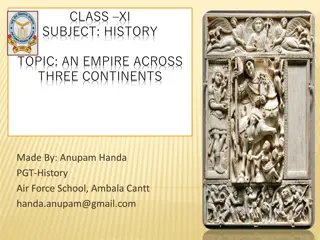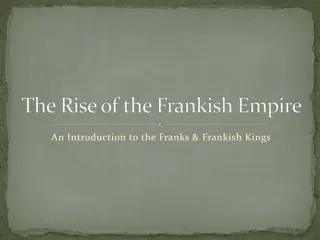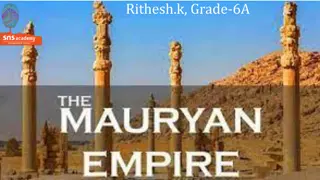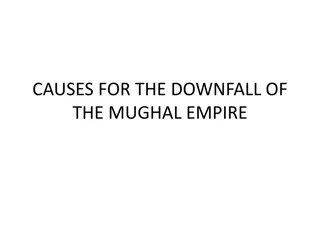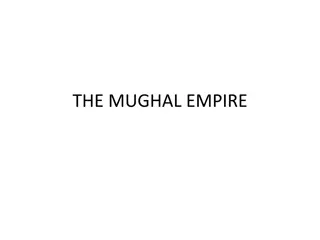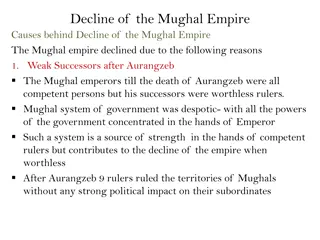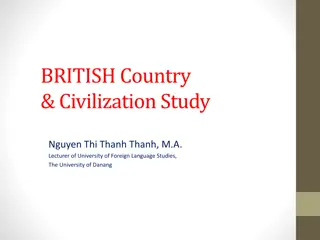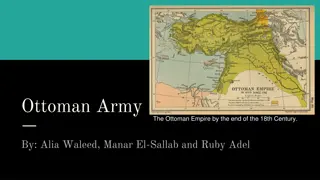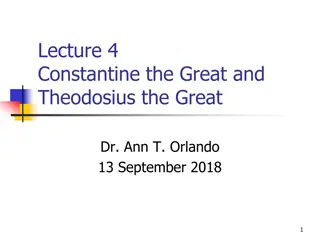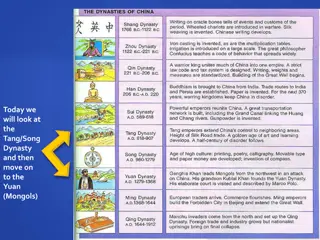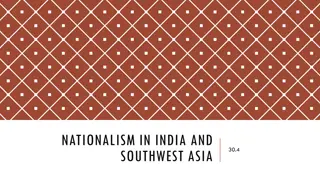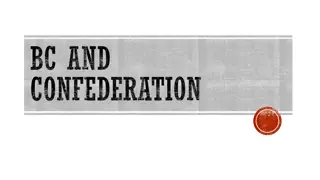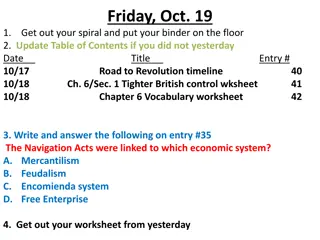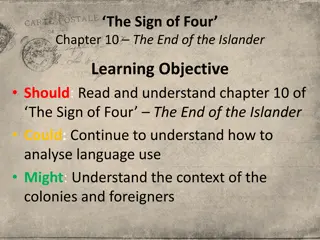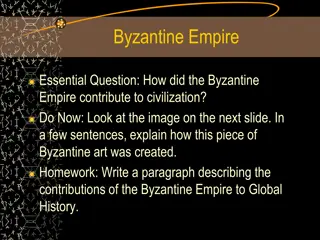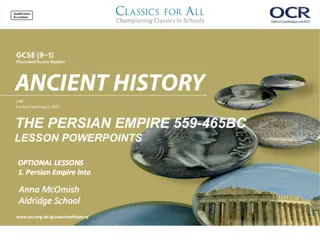The Shifting of India's Capital: The Story of New Delhi
The decision to move the capital of India from Calcutta to Delhi in 1911 led to the creation of Imperial Delhi, now known as New Delhi. This move was a reflection of British colonial rule in India, marked by controversies, cost overruns, and disagreements among architects. The shift was influenced b
1 views • 19 slides
Mauryan Empire: Expansion, Administration, and Legacy of Ashoka
The Mauryan Empire, ruled by Chandragupta, Bindusara, and the renowned Ashoka, witnessed significant expansion and innovative administration methods. Through taxation, infrastructure development, and royal appointments, the empire flourished. Ashoka's reign marked a shift towards peace, public welfa
4 views • 7 slides
Outline of Mughal Empire Mughal Empire 1526-1707.
The Mughal Empire in India from 1526 to 1707 was a significant period marked by notable rulers such as Babur, Humayun, Akbar, Jehangir, Shah Jehan, and Aurangzeb. These emperors each contributed differently to the empire's development, with highlights including military conquests, administrative ref
7 views • 14 slides
Ottoman Empire Territorial Contraction in the 18th Century
Ottoman Empire faced agricultural and fiscal crises in the 17th century, leading to internal rebellions. However, by the mid-17th century, the empire had recovered and experienced further expansion, albeit at a slower rate compared to the previous century. In the 18th century, the Ottomans suffered
2 views • 12 slides
Understanding the Growth of the Songhai Empire
Delve into the factors that fueled the growth of the Songhai Empire in West Africa for nearly 150 years. Explore the key reasons behind its rise to power and the significance of its dominance in the region. Work collaboratively to uncover evidence supporting the various factors that contributed to t
1 views • 6 slides
Writing an Evidence-Based Claim in History: Unraveling the Gupta Empire's Legacy
Delve into the art of crafting an evidence-based claim by exploring the historical context of the Gupta Empire. Understand the significance of formulating a well-supported thesis statement and backing it up with thorough evidence analysis, particularly focusing on the empire's achievements in mathem
0 views • 5 slides
Reflection on George Orwell's Essay "A Hanging" and Its Context
George Orwell's essay "A Hanging" reflects his experiences as a British police officer in Burma, highlighting social inequalities and his anti-capital punishment sentiments. Through vivid imagery and symbolism, Orwell evokes readers' sympathy for the condemned prisoner, shedding light on the banal r
1 views • 61 slides
Overview of the Ottoman Empire's Economy and Social Structure
The history of the Ottoman Empire's economy and social structure encompasses its Turkish and Islamic influences, as well as its geographical diversity across regions like Asiatic, East European, and African territories. The empire's centuries-long existence from 1300 to 1918 saw distinct periods of
3 views • 105 slides
An Introduction to British Media: Overview of Print and Digital Platforms
This content provides an insightful overview of the British media landscape, focusing on newspapers, television, radio, and social media. It discusses the distinctions between tabloids and broadsheets, highlighting the influence of British media on social and political views. Key characteristics of
1 views • 43 slides
A Glimpse of Chola Empire: Rise and Fall of an Ancient Dynasty
The Chola Empire, under rulers like Vijayalaya, Aditya I, and Rajaraja I, witnessed periods of expansion, conquests, and cultural advancements. Their efficient administration, economic prosperity, social structure, and religious practices are discussed, highlighting the empire's zenith under Arumoli
0 views • 11 slides
British Administration in India: 1639-1726 Development
Development of British administration in India from 1639 to 1726 under the British East India Company, including the formation, charter, legislative powers, judicial system, and establishment of trading centers like Surat. The administration of justice and court developments during this period are h
0 views • 22 slides
An Empire Across Three Continents - A Historical Journey
Explore the fascinating history of an empire spanning three continents, from the rise of trade networks in the Assyrian empire to Alexander the Great's conquests and the evolution of Rome into a dominant power. Discover the shared cultures, languages, and sources that illuminate the rich past of the
1 views • 34 slides
The Rise of the Frankish Empire: A Journey Through History
Explore the fascinating history of the Frankish Empire from the conquest of Gaul by the Franks in the 5th century to the reign of Charlemagne as the Holy Roman Emperor. Discover key events such as Clovis I's unification of the Franks, Charles Martel's victory at the Battle of Tours, and Charlemagne'
4 views • 6 slides
Development of Indian Penal Code (IPC) 1860 and Its Impact in British India
The Indian Penal Code (IPC) of 1860 was introduced in British India after a series of historical events led to the need for a comprehensive criminal justice system. The disintegration of the Mughal Empire paved the way for British takeover, resulting in variations in criminal laws across different B
1 views • 24 slides
Discovering the Rich History of Hampi: A Glimpse into the Vijayanagara Empire
Hampi, also known as Vijayanagara, holds the remnants of a once grand empire founded in the 14th century. The discovery of this historical site in 1800 by Colonel Colin Mackenzie marked the beginning of unveiling its treasures. From its origins under Harihara I and Bukka I to the golden era under Kr
0 views • 18 slides
Hinduism Flourishing in the Pandyan Empire
Hinduism flourished during the period of the Pandyan Empire, with rulers giving extensive donations to Saiva and Vaishnava temples. They provided endowments for temple renovation and maintenance. Notable rulers like Maravarman Sundara Pandyan and Jatavarman Sundara Pandiya contributed significantly
0 views • 18 slides
England's Restoration Period and the Rise of the British Empire
England saw significant historical events during the Restoration Period and the eighteenth century. From Charles II's restoration to the Glorious Revolution, the Act of Union of 1707, and the rise of British dominions worldwide, this era marked political stability, literary contributions, and the gr
1 views • 22 slides
Overview of Mauryan Empire: Chandragupta, Bindusara, and Ashoka
Mauryan Empire, established by the Mauryas, was the first major empire in India, encompassing a vast territory and surpassing previous dynasties in land control. Chandragupta Maurya, Bindusara, and Ashoka were key emperors who shaped the empire's history. Chandragupta, supported by Chanakya, conquer
0 views • 13 slides
Carnatic Wars in the 18th Century: Conflict between Indian and British East India Companies
Carnatic Wars were a series of military conflicts in the mid-18th century between the Indian Company, British East India Company, and various independent rulers. Total of three wars were fought - First Carnatic War (1746-48), Second Carnatic War (1749-1754), and Third Carnatic War (1757-1763). The w
1 views • 12 slides
The Impact of the British Empire on Scotland: Lessons and Reflections
Exploring the historical significance of the British Empire on Scotland, this lesson delves into the interconnections between the two entities. It examines various aspects such as population movements, cultural investments, economic influences, and the overall positive impact on Scotland. By investi
0 views • 12 slides
Causes for the Downfall of the Mughal Empire
The decline of the Mughal Empire post-Aurangzeb's reign was due to factors such as religious persecution, the Deccan policies, weak successors, financial difficulties, neglect of sea power, European settlement, and invasions. These political, social, and economic issues contributed to the downfall o
0 views • 9 slides
The Mughal Empire: History and Legacy
The Mughal Empire was founded by Babur, a skilled statesman and conqueror. His military conquests paved the way for the empire's expansion in India. Babur's son Humayun faced challenges during his reign, leading to a period of instability. Despite difficulties, the Mughal Empire left a lasting impac
0 views • 13 slides
Causes Behind the Decline of the Mughal Empire
The decline of the Mughal Empire was influenced by weak successors after Aurangzeb, degeneration of Mughal nobility, inefficiency of the army, economic bankruptcy, foreign invasions, wars of succession, and court factions. The empire faced challenges such as incompetent rulers, weakened military, fi
2 views • 5 slides
British Holiday Traditions and Bank Holidays Overview
Exploring British holiday traditions, vacations, and bank holidays, this study covers the significance of holidays in the UK, including vacation patterns, paid leaves, and common travel destinations. It delves into the differences between holidays in British English and American English, highlightin
1 views • 29 slides
Rise and Fall of the Ottoman Empire's Military Power in the 18th Century
The Ottoman Empire's military success in the 18th century was attributed to their expertise in using gunpowder, loyal soldiers, strong organization, multilingual education, and strategic planning. However, the empire faced decline due to dated cultural practices and increasing European power, leadin
1 views • 17 slides
The Transformation of the Roman Empire: Constantine and Theodosius
The lecture delves into the significant reigns of Constantine the Great and Theodosius the Great in the context of the Roman Empire's historical changes. It explores the social and ecclesial impact brought about by Constantine's policies and examines the political landscape during the early fourth c
0 views • 29 slides
Rise and Legacy of the Mongol Empire
The rise of the Mongol Empire under Genghis Khan, the unification of Mongols, conquests, and the establishment of the Yuan Dynasty by Kublai Khan are highlighted. The Mongols' military prowess, organizational skills, and cultural adaptability led to the largest land empire in history. The Pax Mongol
0 views • 11 slides
Challenges of Empire: From Proclamation to Rebellion
During the period of 1763-1776, the British Empire faced challenges in America resulting from increased taxes, acts restricting colonial autonomy, and resistance from colonists. This led to a series of events including the Currency Act, Sugar Act, Stamp Act, and Townshend Acts, triggering protests,
0 views • 11 slides
Impact of British Empire and Commonwealth on Migration: Unpacking Immigration Stories
Explore the historical impact of the British Empire and Commonwealth on British migration through six immigration stories. Understand how relations with former colonies have shaped diversity in Britain and influenced British immigration patterns. Key terms like migration, emigration, empire, and col
0 views • 23 slides
Nationalism in India and Southwest Asia: A Historical Overview
The aftermath of World War I led to a surge in nationalism in India and certain Southwest Asian countries, as empires like the Ottoman Empire and the British Empire showed signs of weakening. Indian nationalism grew due to factors such as promises of reform by the British, religious divisions, and e
0 views • 15 slides
Challenges and Choices in British Columbia's History
British Columbia faced economic challenges post the Gold Rush, leading to a consolidation of colonies and increasing debt. The united colony explored options of Confederation, maintaining British colonial status, or annexation by the US, driven by different groups with varied interests. This histori
0 views • 10 slides
Achievements of the Gupta Empire in India
The Gupta Empire in India flourished during its Golden Age, marked by peace, prosperity, and significant advancements in science, mathematics, astronomy, and medicine. Led by rulers like Chandra Gupta II, the empire fostered trade, innovation, and cultural exchange, influencing the spread of Indian
0 views • 9 slides
Impacts of British Rule in India
Explore the historical journey of British colonialism in India through key events such as the expansion of the East India Company, cultural changes, imposition of British laws, the Sepoy Mutiny, and subsequent protests. Witness the transformation of Indian society and the rise of resistance against
0 views • 17 slides
Colonial Challenges Under British Rule
In this academic material, students are instructed to update the Table of Contents and engage with resources related to tighter British control over the colonies. The tasks include exploring historical events like the Proclamation Act of 1763, Quartering Act, Sugar Act, Stamp Act, Declaratory Act, a
0 views • 18 slides
Colonial Influences and The British Empire
The British Empire once ruled over vast territories, including parts of North America, India, and Africa. European countries colonized other nations to expand trade and acquire resources. Colonization ceased in the 20th century due to moral objections and independence movements in colonies. The spre
0 views • 15 slides
The Contributions of the Byzantine Empire to Civilization
The Byzantine Empire made significant contributions to civilization through art, law, religion, and centralization of government. The empire's legacy includes the preservation of Roman laws, promotion of Christianity, accumulation of church wealth, and establishment of Constantinople as a key center
0 views • 22 slides
Overview of the Mughal Empire and Its Great Mughals
The Mughal Empire was a significant imperial power in the Indian subcontinent from 1526 to 1757, ruled by Muslim descendants of Genghis Khan. The empire extended over a vast region and produced six great Mughal rulers: Babur, Humayun, Akbar, Jahangir, Shah Jahan, and Aurangzeb. Babur was the founder
0 views • 14 slides
Exploring the Ancient Persian Empire: Lessons and Tasks
Delve into the intriguing history of the Persian Empire with lessons focusing on its geography, rivals, and ruling dynamics. Engage in tasks such as chronological order puzzles, map analysis, and discussions on empire-building qualities. Uncover the complexities of the Middle East in 600 BC and the
0 views • 9 slides
The Byzantine Empire: Society, Achievements, and Decline
The Byzantine Empire, established in 527 A.C, was marked by religious conflicts and military advancements. The society was patriarchal, centered around Christianity, and had a hierarchical structure. The empire made significant progress in weaponry and trade, although frequent battles ensued. Despit
0 views • 7 slides
Byzantine Empire and Eastern Orthodox Church Overview
The Byzantine Empire, also known as the Eastern Roman Empire, flourished from 330 CE to 1453 CE under Greek rule. It played a significant role in trade, politics, and culture during the Post-Classical Era, connecting trade routes and reconquering the West under rulers like Justinian. However, challe
0 views • 9 slides

